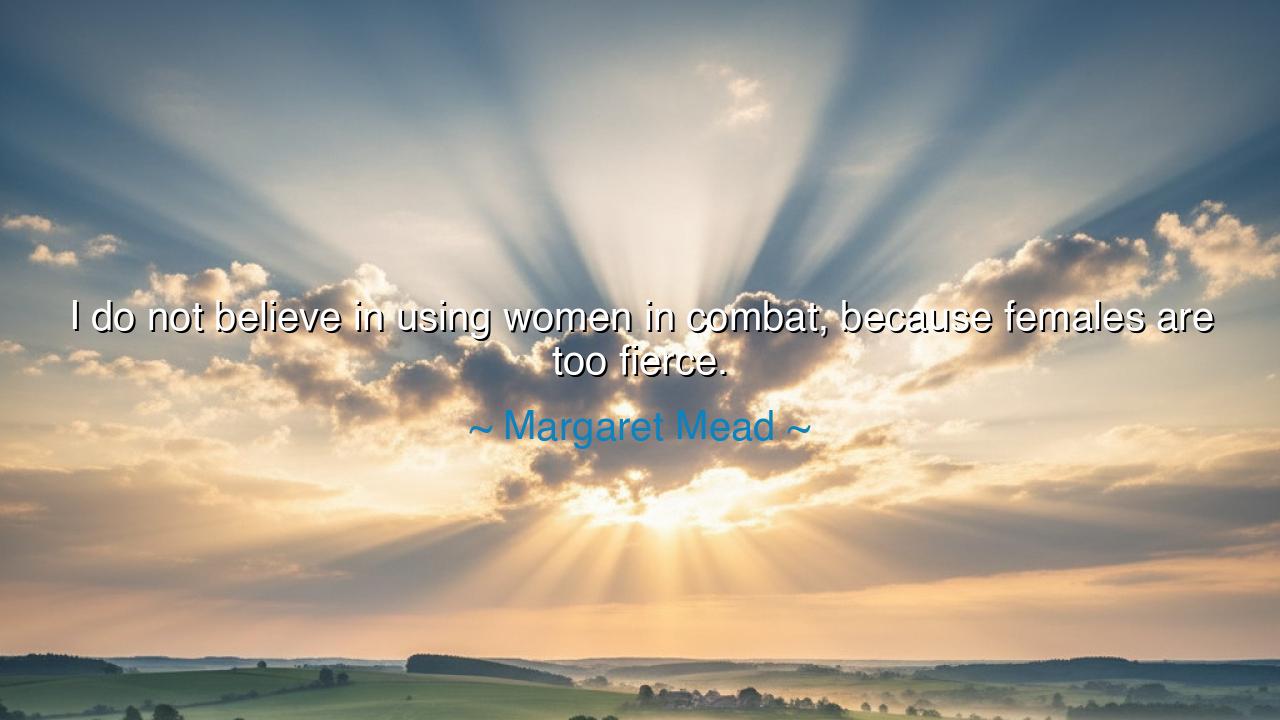
I do not believe in using women in combat, because females are






Hear, O seekers of wisdom, the paradoxical words of Margaret Mead: “I do not believe in using women in combat, because females are too fierce.” In this utterance, the great anthropologist strikes at the heart of an ancient truth—that the strength of women is not weakness nor fragility, but a fierceness so deep that it could overwhelm the very bounds of war. She does not say women are unfit, but that their power, once unleashed, would alter the nature of the battlefield itself.
For the world has long spoken of women as gentle, nurturing, and tender. Yet Mead reminds us that this is only half the truth. In the defense of children, in the survival of families, in the endurance of hardship, women reveal a fierceness that is unyielding, elemental, and relentless. To place such power into the formal machinery of war, Mead warns, may be to awaken forces that men themselves have never fully understood.
History whispers her meaning. Think of the Dahomey Amazons of West Africa, a regiment of women warriors feared by all who faced them. Trained in discipline and battle, they fought with a ferocity that astonished European armies, proving that women, when called upon, could be deadlier than men. Or recall Boudica, queen of the Iceni, who led her people in revolt against Rome. Her fury burned so hot that whole cities fell beneath her wrath. These stories reveal that when women take up arms, they fight not only with strength but with the fire of survival itself.
Yet Mead’s warning carries another layer: that society has often feared to admit the true strength of women. To label them as “too fierce” is both reverence and caution, acknowledging their potential while seeking to contain it. Her words remind us that women’s power has always existed, though often hidden or ignored, and that if ever fully embraced, it would transform not only combat, but the very nature of human struggle.
Therefore, O children of the future, let this be your teaching: do not mistake gentleness for weakness, nor fierceness for cruelty. In women, as in men, there lies both tenderness and fire. Mead’s words endure as a riddle and a truth: women have not been kept from battle because they cannot fight, but because, once awakened, their spirit is too fierce to be denied.






LVlinh vu
Mead’s statement about women being 'too fierce' for combat is an interesting one, but it seems to come from an outdated framework. Why would fierce women be considered a problem in combat? Isn't the ability to be fierce an asset in military situations, where resilience and strength are key? This perspective reflects the cultural bias that has historically limited women’s roles, especially in challenging environments like combat.
DNDa Nguyen
Margaret Mead's comment about women being 'too fierce' for combat seems rooted in a dated and limiting view of gender. Why should fierceness be a barrier to combat roles? In fact, many would argue that fierceness could be an asset in battle. Her comment seems to reinforce stereotypes about gender roles, implying that women’s strength is somehow 'too much' for certain situations. Could this belief be part of why women were historically excluded from combat positions?
HLDo Ha Linh
Mead's belief that women should not be involved in combat because they are 'too fierce' raises questions about how we define strength and aggression. Are these qualities inherently harmful when possessed by women, or are we simply afraid of challenging outdated gender norms? Combat requires bravery and emotional resilience, so why would fierceness—typically seen as an asset in warfare—be seen as a hindrance for women specifically?
NHTri Nguyen Huu
I find Margaret Mead’s comment about women being 'too fierce' for combat somewhat concerning. It plays into the idea that women’s strength and intensity are somehow threatening or unnatural in a military context. But isn’t that exactly the kind of toughness needed in warfare? This view seems to limit women’s potential by associating fierceness with negative traits, instead of acknowledging the value of strength, resilience, and tenacity in both genders.
PLPhan Thi Phuong Linh
Mead’s perspective on women in combat is puzzling, especially in today’s context. It implies that women’s strength could somehow be detrimental in combat, which seems counterintuitive. Aren’t the qualities of fierceness, resilience, and determination precisely what’s needed in high-stakes environments like combat? Is there a hidden cultural bias in her view, suggesting that women’s emotional and physical capabilities are inherently different or unsuitable for warfare?